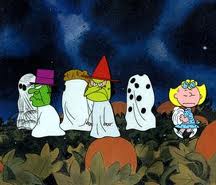With autumn’s arrival come squash soups, crispy leaves, cozy sweaters and my favorite celebration – the incredibly strange custom we call Halloween. As this tradition has been celebrated in America for hundreds of years, we tend to take its oddity for granted.
There are many strange things about this holiday, but there are a few I find particularly odd. For instance, it is a well-known fact that parents in this country are paranoid (which is why I will avoid the whole reproduction debacle). We are told throughout our youth “Don’t talk to strangers.” “Never accept anything from a stranger.” “Be home before dark.” Thanks to the culture of fear produced by our mass media, many parents today believe everyone is a predator and out to get their child. This has created even more paranoia and strict rules imposed by parents on their children. However, on Halloween? Anything goes! Parents happily send their children out into the streets well past dark to beg for candy from strangers. In the parents’ defense it is probably wise to prime their children for begging on the streets before they graduate college $50,000 in debt. So on one day of the year, parents let go of all their inhibitions concerning their child’s safety in the name of tradition.
Another odd thing about Halloween is how we go about asking for the candy. As a child this phrase was given to me with little explanation. “Trick or treat” gets you candy in the bag, which for years I understood as “tricker treat.” While it made no sense, the phrase seemed to have magical and wonderful results. It was not until someone said “trick” and the candy did not appear that I had to rethink my whole approach.
A simple search yielded satisfactory results as to why we say “trick or treat” and not “I would like some candy, please.” According to this article, the practice of trick or treating came over with European immigrants. The ancestor of this tradition comes from “guising” wherein “children performed small entertainments before being given gifts.” Now, in our very own American version of this tradition, “sweets [are] expected without the party piece.” Leave it to the Americans to expect something for nothing, am I right?.
As a side note, I found it interesting how the French have interpreted our trick or treating tradition. I read a book on French culture for a course I followed last semester. In one passage, the authors explained how the French have adopted our weird tradition of trick or treating. As the French love to protest (manifester), their children take to the streets in this tradition shouting, “Nous voulons des bonbons!” (“We want candy!”) You probably find this weird. I know I chuckled in class when we discussed this. What a bunch of brats running around the streets impolitely demanding candy. Aren’t the French supposed to be sophisticated?
But this is exactly why I want to step outside of our own subjective view of American culture and look at our traditions for what they are – totally bizarre from a foreigner’s perspective. In fact, the French may have it right as they will never experience that moment of disappointment and confusion when the possessor of the candy replies, “Trick.”



